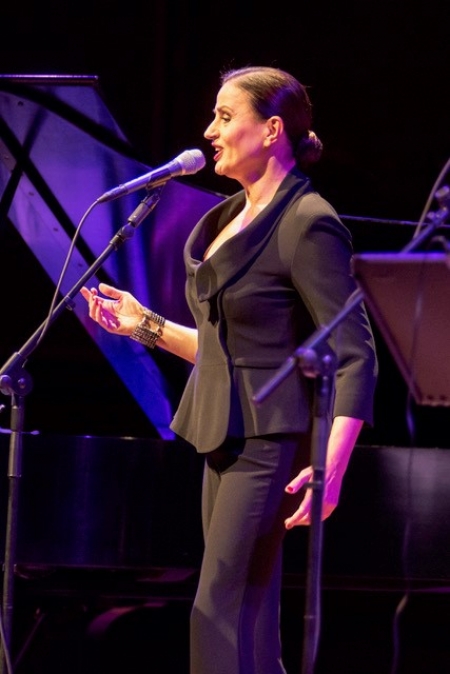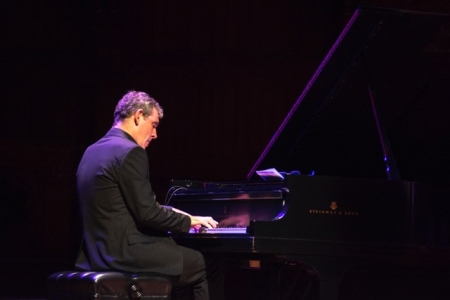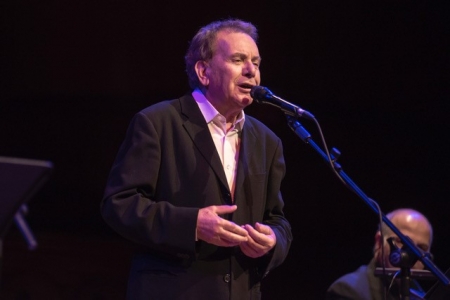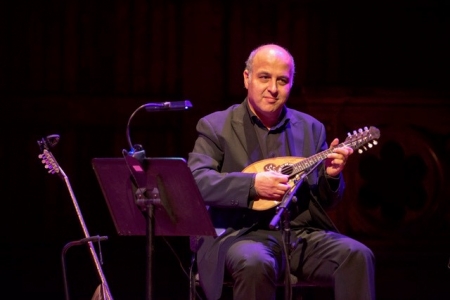CAMBRIDGE, MA— On Sunday, October 14, 2018, the Harvard Library celebrated the arrival of the archive of influential Greek poet and lyricist Nikos Gatsos (1911-1992) by presenting “The Gatsos I Loved: A Concert” at Harvard University. Over seven hundred people packed the historic Sanders Theatre to hear the legendary Greek singer, Manolis Mitsias, and renowned actor, Karyofyllia Karabeti, perform songs written by the poet and put to music by composers Manos Hadjidakis, Mikis Theodorakis, and Stavros Xarhakos.

Manolis Mitsias opened the show with the “The North Star” («Τ’αστέρι του βοριά») the opening song from Elia Kazan’s “America America.” Speaking in Greek, Mitisas welcomed the audience and praised Gatsos: [translated from the Greek]: “Personally, I feel fortunate to have interpreted a great poet, a unique craftsman of verse, of our song. Gatsos opened the door so that I could enter a dream world that I never imagined was possible. He led me to work with great composers, great lyricists, great songs. That's why I feel so lucky.”
Karyofyllia Karabeti welcomed the audience in English: “This is a proud and important moment for Greeks everywhere. Harvard University, one of the world’s most prestigious universities is now the home of a great ambassador of the Greek language, and to quote Gatsos himself, ‘for us writers, language is our home country.’”
Classical pianist Achilleas Wastor and traditional bouzouki and mandolin player Heracles Zakkas, provided harmonic arrangements with Greek folk ornamentations to complement the golden voice of Mitsias. Karabeti delivered a full range of emotions both in her singing and readings, which included excerpts from Nobel laureate Odysseus Elytis and Manos Hadjidakis, in praise of Gatsos. The performers delighted the audience who were spontaneously clapping and singing along to the familiar tunes.

People came from throughout New England and beyond for the unique opportunity to see this single U.S. performance. Honored guests included the former Prime Minister of Greece Lucas Papademos, Consul General of Greece in Boston Stratos Efthymiou, and Secretary Achilles Rakinas from the Embassy of Greece. Former Harvard President Drew Faust’s vision for “One Harvard” was clearly on display as distinguished Harvard faculty colleagues were in attendance: Dimiter Angelov, Kathleen Coleman, Eurydice Georganteli, Michael Herzfeld, Ioli Kalavrezou, Gregory Nagy, Nicolas Prevelakis, Panagiotis Roilos, and Mark Schiefsky. The Greek academic community was also strongly represented with faculty and students from the Boston area, and from as far as Brown and Yale Universities.

Manolis Mitsias, together with Agathi Dimitrouka, conceived the program, which has been performed throughout Greece and Cyprus. Dimitrouka, Gatsos’s life partner, and poet, lyricist, author, and translator in her own right, reveals that Gatsos had no interest in his legacy. “Wouldn’t I be committing a crime?” she asks, “If I were to let things he himself had not destroyed, vanish? And so, instead of them vanishing, I fought so they would be presented as brilliantly as possible!” The Gatsos I Loved concert was certainly a brilliant and enduring homage to Greece’s beloved poet and a joyous way to celebrate the archive’s arrival at Harvard.
Rhea Lesage, Librarian for Hellenic Studies at Harvard, organized and produced this historic event, in close collaboration with Agathi Dimitrouka. The Harvard Library, the Harvard Center for Hellenic Studies, the Gerondelis Foundation, and the Merriam Family Fund in honor of the Kalambaka Library, provided generous support to make it possible.

The archive of Nikos Gatsos is now under the curatorship of Leslie Morris, Gore Vidal Curator of Modern Books & Manuscripts at Houghton Library. Morris and Lesage are working closely to oversee the detailed cataloging of the collection, and it will take many more months to reveal the richness of the papers and books for the study of Greek language and culture at Harvard, and beyond. A preliminary finding aid is now available in the HOLLIS catalog, and the archive is now open to students and researchers everywhere.